 |
| Chief Guest of the evening and Member Planning
Commission, N.K. Singh, delivers his keynote address, as (from
left) P.R.S. Oberoi of East India Hotels, Jagdish Khattar of
Maruti Udyog, Rajiv Kaul of Microsoft India, and Siddharth Verma
of Reebok India Co. look on |
Where
there is no vision, the people perish.'' Bible (Proverbs 29:18).
The starkness of that truth was evident to the enlightened thousands
of years ago. That truth today is a pressing imperative to a nation
of one billion, standing at the cross-roads. Consider the country's
dilemma: it has a quarter of the world's poor; its per capita income
of $450 ranks 162-lower than that of El Salvador. Infant mortality
rate at 83 per 1,000 is higher than China's 36; adult literacy rate
is lower than even Bangladesh's, and only 46 per cent of urban population
has access to sanitation, although smaller countries like Costa
Rica and Malaysia have eradicated that problem.
On the other hand, India is an emerging software
powerhouse. By 2008, software and it-related services are expected
to fetch $87 billion in revenues (as per Nasscom-McKinsey estimates).
It has a huge English-speaking workforce that costs much less than
those in most other countries-a reason why more and more back-office
work, and even design work, is moving to India. So, what we have
essentially is two Indias: one that is growing, prospering and getting
integrated globally, while the other is poor, isolated, and starving.
Whether or not this divide can be bridged is
not a question; for, it has to be done. Rather the question is how?
The answer to that must begin with a vision; an idea of the ideal
nation. A vision of an India where the fruits of economic labour
hang low for all to pick; a vision that confers economic independence
and self-respect to despairing millions.
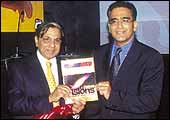 |
| BT's Editor-in-Chief Aroon Purie hands over
a copy of the special issue to N.K. Singh for launch. |
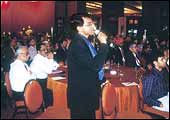 |
| A member from the audience of 300-plus poses
a question to the panelists. |
So, what kind of an over-arching vision should
India build? How must the fabric of that great dream be woven? When
Business Today put these questions to corporate India, 50 of its
best CEOs came forward with their insights and solutions, all of
which has been packed into a special issue entitled 'The New Visions'.
The 50 essays form part two of our four series on India Inc: The
Next Big Leap, the first being on The New Entrepreneurs, released
three months ago.
To mark the launch of the special issue, BT
invited more than 300 of Delhi's corporate honchos-including, among
others, Sudershan Banerjee, CEO, Hutchison Telecom (Essar JV); Naina
Lal Kidwai, Vice Chairman, JM Morgan Stanley, O.P. Lohia, Managing
Director of Indo Rama Synthetics, and K. Swetharanyan, Managing
Director, Gestetner India-to an action-packed evening at the Hyatt
Regency's Ball Room.
Four CEOs who had originally written essays
for the special issue were invited to present their immediate concerns
in the form of a brief presentation each. These CEOs were: P.R.S.
Oberoi, Vice Chairman and Managing Director, EIH Ltd; Jagdish Khattar,
Managing Director, Maruti Udyog; Rajiv Kaul, Managing Director,
Microsoft India; and Siddharth Verma, Managing Director, Reebok
India Company. The Chief Guest for the evening, N.K. Singh, former
Secretary to the PMO and currently Member of Planning Commission,
launched the special commemorative issue.
Flagging off the evening, Singh gave a number-crunching
perspective to where India stood and where it must reach. ''For
the first 30 years (since Independence),'' Singh said, ''we grew
at 3.8 per cent or so. Our per capita income grew by 1.3 per cent.
In the eighties, the GDP was hovering at 5.8 per cent and 3.2 per
cent was the rise in per capita. In the nineties, the GDP growth
was 6.4 per cent and per capita income grew by 4.1 per cent.''
Outlining the numbers, Singh questioned whether
India's growth had been fast enough, and whether its goals had been
visionary enough. The conclusion: not enough on either count. Singh
went on to note that it would be possible for India to achieve growth
rates in the region of 8-9 per cent and make significant gains.
''Every Indian would find gainful employment and every village will
have water supply, literacy will rise from 65 per cent to 85 per
cent, forest cover will go up from 19 per cent to 33 per cent, infant
mortality rate will plummet from 63 per cent to 18 per cent, and
poverty down from 27 per cent by about 10 per cent. This is how
I see the Indian economy developing.''
|
"Tourism can spread prosperity"
|
 |
| P.R.S OBEROI,
Vice Chairman & MD, EIH Ltd |
The tendency among some of my colleagues
in the industry is to blame the government for our problems.
But that is hardly the right approach. Instead, we need to work
together to educate people about the importance of tourism as
a driver of growth and prosperity across the country. Travel
and tourism is the largest industry in the world, but in India
it, unfortunately, hasn't been recognised as an industry. If
we do the right things, this industry can grown exponentially.
India attracted some 2.3 million visitors last year, versus
26 million of China. I believe the number of actual tourists
(excluding business visitors and NRIs) is only 5 lakh. What
can we do to spur growth? I have a short list of to-dos:
» We
need to build good international airports, because that's
the first impression a visitor gets of a country.
» Taxes
in the industry are high. Did you know that a meal at our
hotel in Mumbai attracts a tax of 32.5 per cent?
» We need
to ease visa restrictions. If we make entering this country
difficult, tourists won't come.
» We need
to improve our road and rail network; why can't we have private
trains like in several other countries?
The bottomline is this: Travel and tourism can employ up
to 30 million people over the next seven to eight years-provided
we do the right things.
|
|
"Create an opportunity basket"
|
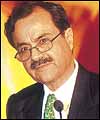 |
| JAGDISH KHATTAR, Managing Director,
Maruti Udyog |
By 2010, we should be in a position
to give our people, what I call, an opportunity basket. This
includes everything: education, healthcare, jobs, clean environment,
and generally an opportunity to prosper. By 2010, we would have
finished six decades as a free nation. Hence, this vision is
modest. As I see it, there are three key systemic weaknesses:
» The
government spends more than what it earns, and public debt
is ballooning. We need to curb it.
» We are
subjecting our people to global competition without preparing
them adequately for it.
» Our
labour productivity continues to be low compared to countries
like the US.
» That
said, there are three positive factors in our favour:
» We are
able to produce global players.
» We are
a big nation and, hence, will always be on the global radar
» We are
globally competitive in some sectors such as IT
To realise our vision 2010, we need the three components
of our economy to work together: the government, industry,
and the individual. The state will have to create the proper
environment, industry will have to become more competitive,
and the individual will have to become more productive and
skilled to be effective.
Overall, the times ahead will be difficult, but one filled
with challenge and excitement.
|
Singh, who turned up in his trademark yellow
tie, also handed out a five-pronged caveat. He said however hopeful
he was of the future, it would all come to nought unless the dangers
are taken into account.
- There needs to be much greater national
consensus on economic reform. This consensus is weakening.
- The issue of fiscal management has to be
addressed. There is need to redress the finances of the state
and the Central governments and the fiscal deficit of the government
should be made more manageable.
- Infrastructure needs to take a sharp growth
curve. Power has to be made more available and affordable, telecom
deregulation has to gather momentum, the road network has to be
expanded, the privatisation of the port sector need more steam
to increase turnaround time.
- The fourth issue is not really about the
digital divide, but the growing regional divide. There are large
disparities between the states-there are some growing at 8-9 per
cent and those growing at 2 per cent. This needs correction as
it could lead to social tensions.
- The pattern and quality of growth must keep
pace with the employment level in the economy. And for sustainable
employment, the services sector should grow. "We will have
to become a global partner in a rapidly integrating world economy,"
Singh stated.
The four panelists more or less spoke in line
with Singh. It was clear that a vision of this magnitude can not
be pulled off either by industry or the government alone. In fact,
as Jagdish Khattar of Maruti Udyog pointed out, a three-pronged
collaboration among the administration, industry and individuals
was required to reinforce the gains that each made separately (See
''Create an opportunity basket'').
What was heartening for the audience of 300-plus
to hear was the fact that despite the problems industry and people
in general faced in their day-to-day lives, the experts on the panel
believed that India had a lot of things going its way. Rajiv Kaul
of Microsoft, for example, said that he believed India would be
a major economic power by 2010. Others like Siddharth Verma of Reebok
pointed to India's vast pool of managerial and technical talent
as a reason for optimism.
That, in fact, was the leitmotif of the 50
essays in the special issue. In his essay, Ratan Tata, Chairman,
Tata Sons, kept referring to telecommunications as one of the forces
that would shape India's destiny. ''Looking ahead,'' he wrote, ''improvements
in connectivity will be one of the important foundations to enable
Indian to be part of the modern world.'' Speaking in a similar vein,
K.M. Birla, Chairman, A.V. Birla group, notes: ''In meeting the
challenges of globalisation, and the consequences of India merging
with the global economy, we are talking of changing the psychology
of people, of broadening the canvas, setting sights on winning a
larger share of a huge opportunity-encouraging people willing to
dream that big dream, and to take that big leap.''
As the evening wore on, an elaborate course-from
the exotic 'tandoori salmon' to the 'New Zealand lamb leg with red
wine'-was exquisitely laid out, and the panelists and invitees got
a chance to mingle over food and wine. Sudershan Bannerjee of Essar
Hutchison, was heard quipping, quoting London Business School professor
Sumantra Ghoshal: ''We Indians know what needs to be done, we don't
have the courage to cover the gap. We need to do it.'' K. Swetharanyan,
Managing Director, Gestetner India, felt that the event was a good
forum ''to think aloud what will happen to India by 2010, with a
wide spectrum of industry sharing its perspectives.''
As the crowd dispersed, the Business Today
glow sign, part red, part blue, displayed a baseline that has embraced
the organisation since the very beginning-'Managing Tomorrow'. And
'The New Visions' not only complements, but also furthers that eternal
baseline. Like the English writer James Allen once said, ''Your
vision is the promise of what you shall one day be....'' And that's
precisely why a nation without any vision will eventually perish.
-additional reporting by Vinod
Mahanta and Abha Bakaya
| "We have to build our infrastructure |
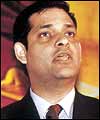 |
| RAJIV KAUL, Managing Director,
Microsoft India |
I feel very confident that by 2010,
India will emerge as a major economic power globally. Take a
look at these numbers: Our GDP is around $500 billion and we
are 1 billion-plus people. Our share of the world trade is 0.8
per cent and that of China 3.4 per cent. If we can double our
per capita income, we would have achieved a great milestone.
I believe we can reach a per capita of $1800 by 2010, with the
population at 1.2 billion. But that involves almost quadrupling
our GDP growth. We can't do this alone; we have to tap resources
of developed countries. But there are some preconditions: one,
industry and government must collaborate to create a more robust
and open economy; two, we have to build our infrastructure and,
three, we have to invest in R&D. India's advantage is its
intellectual talent. Today, most of it is focussed on short-term
gains. Unless you add value, the advantage won't last. We need
to make a big cultural change in terms of bureaucracy: faster
and simpler clearances have to come about, labour and capital
market reforms are also needed, eventually moving towards a
free-market economy. This is needed not only to attract foreign
investment, but also to make Indian industry competitive. Finally,
in the last 10 years, technology played a key role in driving
productivity. The next 10 will see the arrival of a digital
revolution, which will transform business and society. |
| "Smart people in a difficult country" |
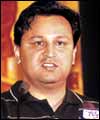 |
| SIDDHARTH VERMA, Managing Director,
Reebok India Company |
My industry is relatively new.
It emerged in the late 70s and early 80s, and was shaped by
broadly three trends: one, acceptance of athletic footwear for
casual purposes; two, entry of (more) women into athletic and
fitness; three, the shifting of athletic goods manufacturing
from the US to Asia. Reebok's management was very excited when
it first came to India. Many things happened subsequently that
changed the initial promise. Therefore, future investment in
India would be tough unless we are able to show returns for
what we already have invested here. Having said that, I am optimistic.
India is a rewarding market. We have been making money last
three years. We are in a position to supply global managerial
talent to our parent in the US. We may not have size, but we
do have growth-even if small. In other words, we are emerging
as smart people who belong to a very difficult country. Still,
we have set a few goals: We want to make a meaningful contribution
(to Reebok) in a global context; 10 years from now, 5 per cent
of Reebok's profits will come from India. The question is how
do we do this? We need to be designed less for metro-centric
consumers; instead we need to have Indianness not only in advertising,
but product and pricing. We need strong export capability. Lastly,
I believe we will continue to grow because we have extraordinary
marketing people. We need to do that across businesses...work
together like a football team. |
|

